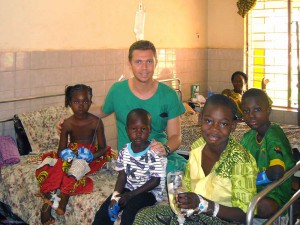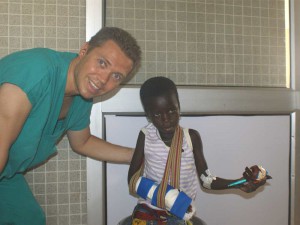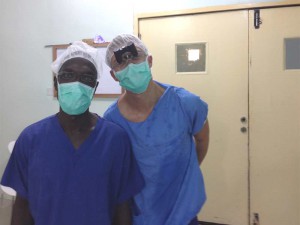 One time I was in Tangueita (Benin), one in Ouagadougou (Burkina Faso), one in Machakos (Kenya), one in Dedome’ (Togo) and for two years I worked as Hand surgeon and reconstructive microsurgeon at Khoforidua (Ghana).
One time I was in Tangueita (Benin), one in Ouagadougou (Burkina Faso), one in Machakos (Kenya), one in Dedome’ (Togo) and for two years I worked as Hand surgeon and reconstructive microsurgeon at Khoforidua (Ghana).
Since 2012 with the Swiss team that I lead, I adhere to the humanitarian project “A HAND FOR AFRICA ‘- Ghana, Kenia, Togo, Benin, Burkina-Faso”, a project of International Cooperation since 2010 organized by GICAM (International Group of Surgeons friends of the hand) NGOs.
The GICAM, founded by Prof. Marco Lanzetta, well known pioneer of hand transplantion surgery, has been active for more than 10 years in humanitarian missions in developing countries to perform directly or increasing by teaching the local health care level.
The project “A Hand for Africa” started in Western Africa and Eastern Africa (Machakos Hospital) then It was extended to India involving an international team of hand surgeons, plastic surgeons and microsurgeons with a long-lasting experience and coming from centers of excellence mainly from Italy, Canada, Switzerland, Czech Republic, Poland and Australia.
People treated are mostly children or young adults who are victims of congenital malformations, nerve palsies, burns or wars.
The big hugs, the warm welcomes coming from the local brothers and sisters or the patients themselves…everytime the same history from 2012 and I wouldn’t have never been changed.
When you arrive, you start working. All patients are coming by walk or getting off cars, taxi or buses. Often the children are accompanied by parents, and they have spent days by walking on the dusty roads, just waiting for a visit. You have to decide who will take an advantage from an operation and who will not. Taking the decision who is gonna be operated and who is not is everytime really hard.
The operating room in Tanguiéta has two operating tables with methods of sterilization of the instruments that would make any scrub nurse from any Western country cry.
Working in Africa and developing countries is different.
It’s a different climate, with different diseases, a different response of the body to pharmaceutical drugs and finally different operating times.
Everything changes, and not just for general conditions. You have to change the surgical technical to solve the problem in the shortest possible time, with the smallest number of operations because It is unlikely that the patient will return for the follow-up – and with the lowest rate of complications. What is normally done in two or more steps in normal settings, Here must be done at once.
There you can find rare diseases that we call, the “big surgical case.” But in those places the same cases are a routine i.e infections by snake bites or devastating burns or complicated vascular malformations, deformities of the hand, and large tumors.
 If you need a vascular surgeon and at the last minute is not available, you must do your best anyway.
If you need a vascular surgeon and at the last minute is not available, you must do your best anyway.
In Africa, anesthesiologists do not exist. The concept of safety is a gift.
In Africa, more than 10% of the population is HIV positive. In in the operating room the utmost care is taken not to cut or prick yourself and avoiding any contact with biological materials. You should avoid any complication. Complications Here are a mess and can be life-threatening.
In a few days you have to complete as many operations as possible, in the best way you can.
Every year we perform 30/40 major operations, most of them being congenital malformations.
Sometimes I would say, you put into the bin 2/3 weeks of holidays, for what? I laugh and become suddenly nostalgic.
Africa is a mix of vitality, human feelings, personal enrichment, sometimes sorrow, often a great joy, which contrasts with the decadent values and the vanishing concept of family of our European old society. I performed flaps reconstruction of the legs to prevent bony exposure and sovrainfection with secondary amputation. It is a shame in Western countries, a terrible catastrophic event in Africa preventing social segregation. These are the real satisfactions of life.
 New missions have already been planned in Kenya and India as part of the GICAM project. A flying operating room in the poorest areas in West Africa has been created, with all the surgical instruments, everything you need to operate sick, deformed, traumatized, amputated hands to give a hope, to rebuild a future, or to restart a job far away from bureaucracy and daily conflicts you have to face with practising inside the Swiss health.
New missions have already been planned in Kenya and India as part of the GICAM project. A flying operating room in the poorest areas in West Africa has been created, with all the surgical instruments, everything you need to operate sick, deformed, traumatized, amputated hands to give a hope, to rebuild a future, or to restart a job far away from bureaucracy and daily conflicts you have to face with practising inside the Swiss health.
In the aforementioned locations the hospitals are suitable to receive and accommodate our contribution as self-refunded surgeons, anaesthesiologists, hand therapists and nurses with no administrative costs and no waste of time and money to build and repair places and technical devices in a stable location. We learned from many years of experience that a hosting hospital for about two weeks is enough, where we carry our instruments in the operating department and you begin to operate on patients previously selected, according to a screening, that gives priority for children and women. Without the bureaucracy and administrative tasks that occupy 30% of the medical time and unfortunately pull back doctors from patient’s care.
Support GICAM:
UBS Switzerland AG
CH360024724716681701D


